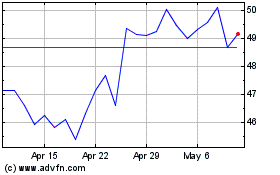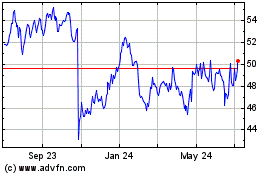Sanofi to Launch Zika Vaccine Research --2nd Update
February 02 2016 - 10:08AM
Dow Jones News
By Noemie Bisserbe and Denise Roland
PARIS-- Sanofi SA said Tuesday it had launched a new research
project to develop a vaccine against the Zika virus, joining the
race to control an outbreak that the World Health Organization said
constitutes a global public health emergency.
Sanofi Pasteur, the French drugmaker's vaccine division, said it
would take advantage of its established research and infrastructure
for its newly approved dengue vaccine--the world's first
immunization program against the mosquito-borne virus--to attack
Zika, a virus in the same family.
"Theoretically, there could be some cross immunity," said
Nicholas Jackson, Sanofi Pasteur global head of research, who will
be driving the new vaccine project. "We will need to investigate
this clinically."
The company also said Tuesday it plans to cut 600 jobs in France
over the next three years as part of its continuing restructuring
plans. Sanofi, which has been struggling with increasing pricing
pressure in some of its main businesses, is now hoping to boost
revenue with new innovative products.
The explosive spread of the Zika virus--the disease could infect
as many as four million people in the Americas by year-end
according to the WHO--could provide pharmaceutical companies an
opportunity to introduce a new blockbuster in an increasingly
important therapeutic category. Analysts estimate that Sanofi's
Dengvaxia could generate around EUR1.5 billion ($1.6 billion) in
revenue by 2020.
It could, however, take years before any new vaccine reaches the
market. It typically takes 10-15 years to develop new immunization,
and can take even longer: Sanofi worked on its dengue vaccine for
two decades. The vaccine's success will also depend on the spread
of the virus when it hits the market, and the ability and
willingness of governments to launch massive vaccination campaigns,
say analysts.
Sanofi's announcement comes a day after the United Nations
public health agency, acting on the recommendations of an emergency
committee, called for more surveillance, research, and efforts to
control the virus's spread. Today, there are no rapid and reliable
diagnostic tests, drugs or vaccines for the Zika virus.
Other companies are also in the race.
Last month, GeneOne Life Science Inc., a South Korean
biopharmaceutical company, said it had launched a joint research
program with U.S. biotech firm Inovio Pharmaceuticals to develop a
DNA-based vaccine to prevent and treat the Zika virus
infection.
U.K. drug major GlaxoSmithKline said last week that it was
assessing its research platform for the potential to develop a Zika
vaccine.
The once-obscure virus, which generally makes people only mildly
ill for a few days, has become a major global health concern over
the past few months, mainly because of its possible links to
microcephaly and Guillain-Barré, a rare disorder in which the
body's immune system attacks nerve cells.
Health authorities in Brazil, whereas many as 1.5 million people
may be infected with the Zika virus, have confirmed 270 cases of
microcephaly since October.
Brazil isn't alone. Authorities now say they believe that some
cases of microcephaly in babies in French Polynesia may be linked
to an outbreak of Zika that occurred there in 2013 and 2014.
Brazilian and international health authorities also say Zika may be
linked to a rise in the number of cases of Guillain-Barré syndrome.
Cases are being investigated in Brazil, El Salvador, and French
Polynesia.
Nick Kostov contributed to this article.
Write to Noemie Bisserbe at noemie.bisserbe@wsj.com and Denise
Roland at Denise.Roland@wsj.com
(END) Dow Jones Newswires
February 02, 2016 09:53 ET (14:53 GMT)
Copyright (c) 2016 Dow Jones & Company, Inc.
Sanofi (NASDAQ:SNY)
Historical Stock Chart
From Aug 2024 to Sep 2024

Sanofi (NASDAQ:SNY)
Historical Stock Chart
From Sep 2023 to Sep 2024
